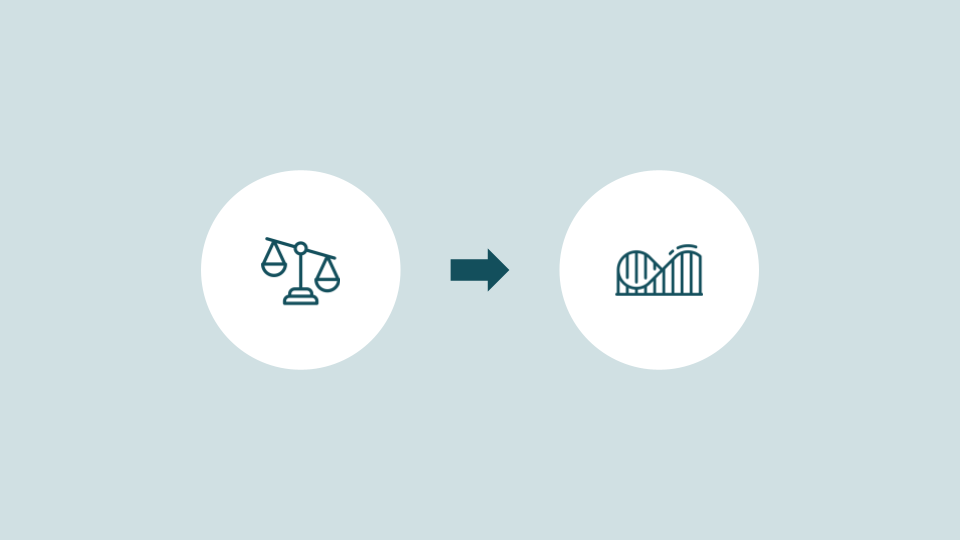The concept of work-life balance implies that work is bad and life is good; it suggests that work and life are two dichotomous entities that need to be strictly separated and kept at an equilibrium; for some, it even insinuates that less work equals more happiness.
In its most neutral definition, work is generally seen as a mean for sustenance and survival—labouring the land to harvest food, then later on, as a way to produce goods and offer services in exchange for security. Because, historically, work was a necessary hardship—from latin labor “toil, exertion”—it’s no wonder we see it in a negative light.
But what about creative work? What about intellectual work? When we research a topic we are curious about and take detailed notes, is this unpaid work? If the older definitions of work seemed to deem it a way to sustain the body, many modern forms of work offer an opportunity to sustain the mind.
In addition, the idea of sustaining an everlasting balance between two aspects as chaotic and unpredictable as our work and life outside of work is an illusion; an impossible task that ignores all the external factors shaping our daily lives.
Everything that is wrong with work-life balance
It doesn’t matter whether you love your work, you hate it, or feel fairly neutral about it: the concept of work-life balance is a counterproductive idea, which will not bring you anywhere nearer to achieve what you actually want to achieve in life. Here are some of the most obvious issues with work-life balance as a goal:
- Work and life are not strictly separated. You may think what you want of Jeff Bezos, but he clearly articulates one of the issues with work-life balance: “That’s a debilitating phrase because it implies there’s a strict trade-off. And the reality is, if I am happy at home, I come into the office with tremendous energy. And if I am happy at work, I come home with tremendous energy. It actually is a circle; it’s not a balance.”
- Your work is not necessarily just a job. Whether they are gardeners, scientists, teachers, nurses, designers, librarians, restaurant owners, many people find genuine joy in their work. Some days may feel more like work in the old sense of the term—strenuous and tiring—while other productive or creative days may give them immense energy.
- Your work may just be a job. On the other hand, maybe your day job really is just a way to pay the bills. In that case, instead of finding work-life balance, you would better spend your efforts on making sure you get paid fairly and on time.
- You may not want to achieve work-life balance. To take the previous idea to the extreme, maybe you want to get to a point where you don’t need to work at all, where you can spend all of your time reading, travelling, catching up with friends. Work-life balance is not a worthy goal in and of itself.
- Work-life balance assumes a narrow definition of work. Raising kids and taking care of a loved one are also activities that require effort and can be draining. Work-life balance assumes these are part of life; undertakings people should manage in addition to their official work.
- Work-life balance is a myth. Perhaps most importantly, achieving a balance means an equilibrium which is a fairy-tale in today’s world. Too many external factors in your life can impact the way work and life are going for you. One day, one of your kids may get sick; another day, you may need to replace a colleague on the spot; yet another day, you may feel a burst of productivity and get so much done you can take a really nice break. It feels different to work in the summer than in the winter; it feels harder to work when you lack sleep; it feels easier when your colleagues are being helpful. These are ever changing factors you can’t control, hence why you cannot expect to sustain an hypothetic work-life balance.
Of course, experts have tried to invent new terms to describe the modern reality of our entangled lives: work-life integration, work-life fit, work-life synergy… But these are semantics, playing with words to hide the basic flaw of considering an outdated vision of work as fundamental to a happy life. So, what’s the alternative?
In praise of serendipity
The alternative is to embrace the chaotic and serendipitous nature of life, to accept that some periods of your life will be filled with work, while others may be leisurely; that sometimes work will be awful, and sometimes it will feel inspiring; that you may have to take a job just to pay the bills, and someday find the perfect role in the perfect company, or maybe start your own company.
The alternative is also to accept that work-life balance is an illusion, something that can’t be achieved. Instead of feeling ashamed because you’re currently on a work-life rollercoaster, raise your hands and laugh when you’re at the top of the tracks, and get ready for when the train goes down.
Be mindful of how you feel. Be open with your friends, families, and colleagues when things are going too fast or getting too messy. Be there for them when their own rollercoaster seems about to derail. It’s a journey, with its twists, turns, and steep slopes. Sometimes it’s fun, sometimes it’s scary. If it was perfectly balanced, we would get bored pretty quickly.

